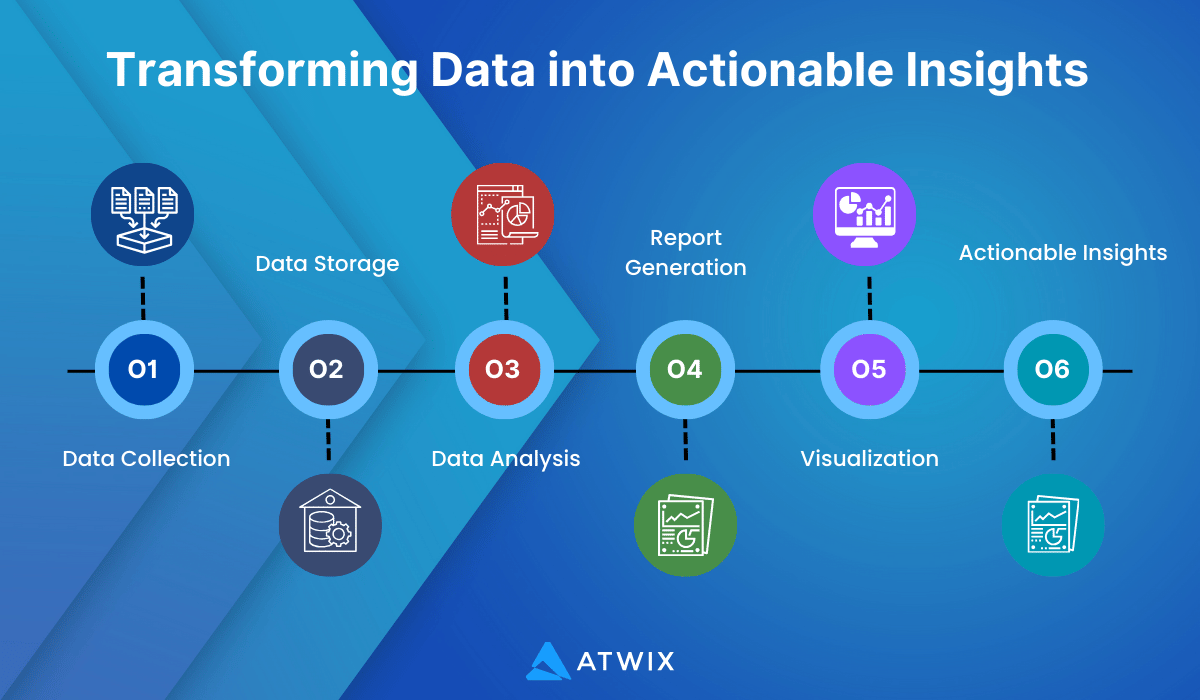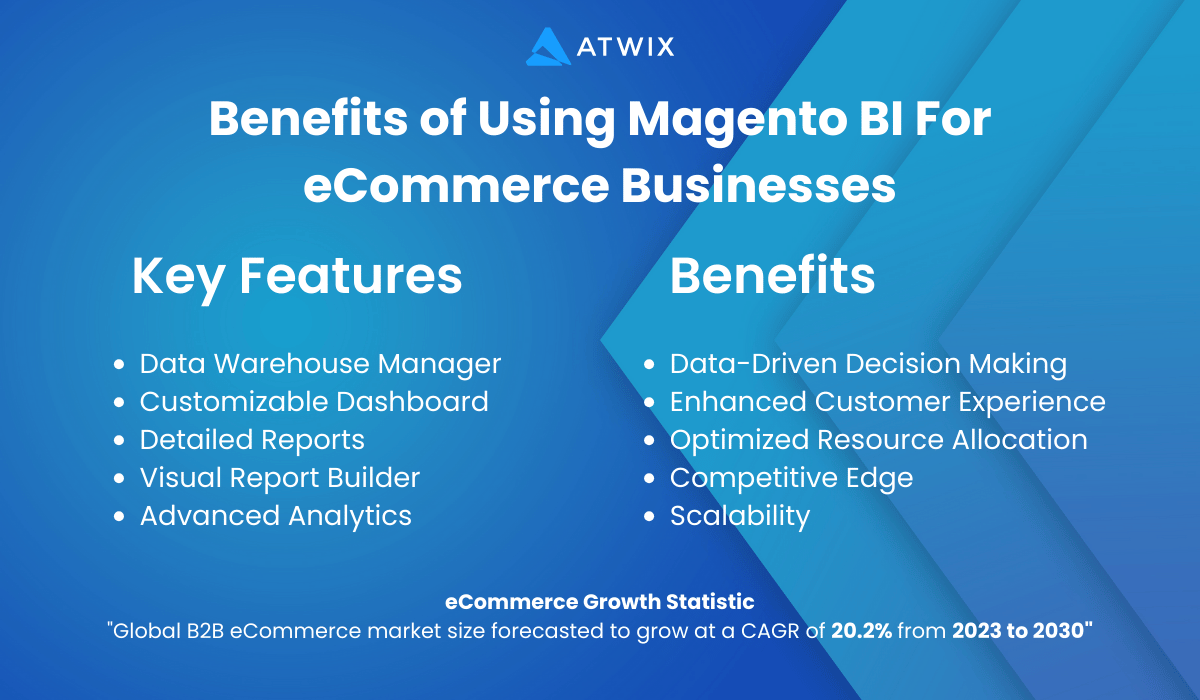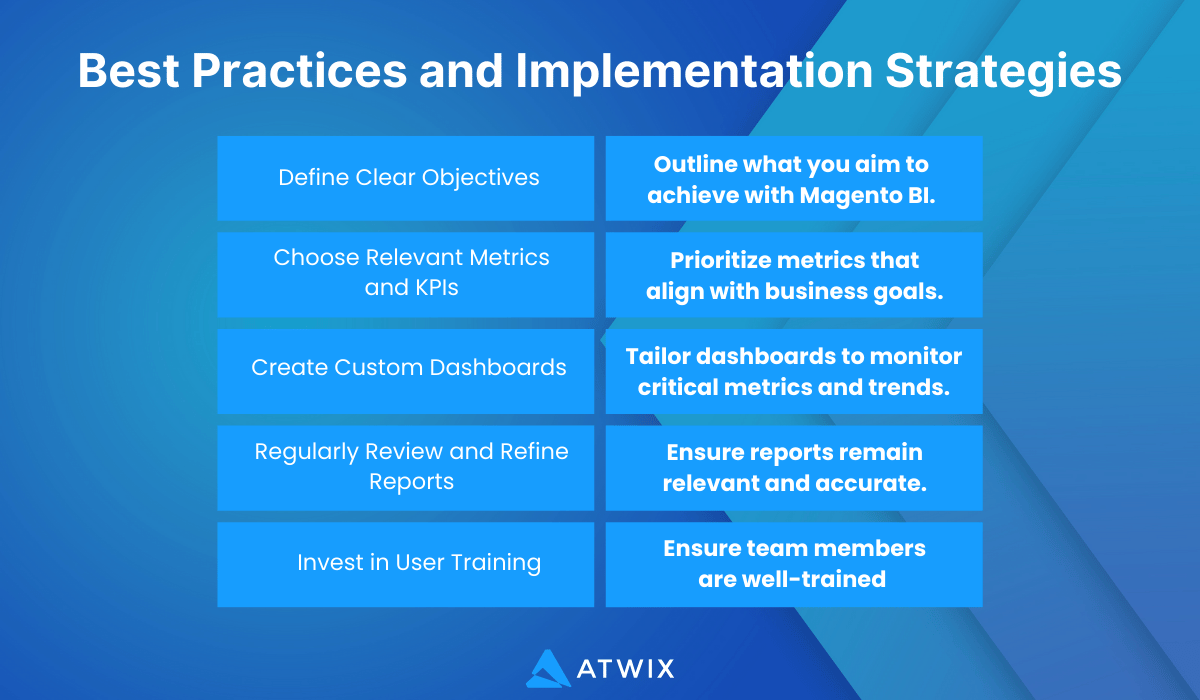In today’s competitive landscape, data-driven decision-making is crucial for eCommerce success. If you’re running your online store on Magento, you have access to a powerful tool: Magento Business Intelligence (MBI). This comprehensive guide will walk you through everything you need to know about leveraging business intelligence with Magento to grow your eCommerce business.
As one of the top-rated Magento (aka Adobe Commerce) development agencies worldwide, our team has been working to set up and improve Magento performance for various businesses across the globe since 2006! This extensive experience has given us deep insights into the nuances and benefits of Magento Business Intelligence. Let’s dive into the essentials of this analytical tool and explore how it can transform your eCommerce operations.
Understanding Magento Business Intelligence

The eCommerce industry continues to expand and develop at a rapid pace. The global B2B eCommerce market size alone is forecasted to grow at a Compound Annual Growth Rate (CAGR) of 20.2% from 2023 to 2030. With this growth comes increased competition, making it essential for business owners to work smarter to succeed.
Magento Business Intelligence is a cloud-based analytics platform designed specifically for eCommerce businesses. It collects, analyzes, and visualizes data from your Magento store and other sources, providing valuable insights to help you make informed decisions.
Making successful and informed decisions requires more than just considering data. There’s an overwhelming amount of information available for eCommerce stores – from page views and conversion rates to repeat purchase rates and much more. All this data needs to be organized and validated before it can be effectively analyzed.
This is where Magento Business Intelligence shines. It structures all this overwhelming data and presents insights in the form of advanced reports and dashboards. As a result, you get a detailed view of all your eCommerce operations, enabling you to improve your business strategies effectively.
Benefits of Using Magento BI For eCommerce Businesses

Implementing business intelligence with Magento can benefit your eCommerce business in several ways:
- Data-Driven Decision Making: Make informed choices based on actual data rather than assumptions. Gaining insights about your customers and their behavior can help you make your sales and marketing strategies more efficient.
- Enhanced Customer Experience: Design a better customer experience by creating different user segments and sending personalized offers. This, in turn, can help boost customer loyalty and satisfaction.
- Optimized Resource Allocation: Gain insights into your business performance and marketing spending, allowing you to allocate costs wisely and take timely actions when necessary.
- Competitive Edge: Stay ahead of your competitors by spotting various trends and useful opportunities earlier than other companies.
- Scalability: Magento BI supports increases in data complexity and volume, ensuring that you’ll always have access to valuable information as your business grows.
Features and Tools of Magento Business Intelligence
To fully understand the power and potential of Magento BI, let’s explore its main features and tools:
1. Data Warehouse Manager
The Data Warehouse is a cloud-based storage system that holds all your valuable eCommerce information. It’s easily accessible from any device when you log in to your account. The Data Warehouse Manager allows you to:
- Discover data from multiple sources
- Add information to tables
- Create charts for user reporting
- Analyze information in real-time
2. Customizable Dashboard
The MBI dashboard presents essential information and allows you to add it to personalized reports, adjusting them as necessary. Key features include:
- Display specific data sources or view all data at once
- Set up report frequency
- Manage dashboard permissions and access for different team members
3. Detailed Reports
Magento BI offers a variety of popular report options:
- Purchase Date History: Analyze the dates when customers make the most purchases to predict sales and optimize your efforts for specific user segments.
- Data History Reports: Obtain data sets for marketing tools to gain a more detailed picture of your history.
- ROI for Marketing and Ad Campaigns: Track orders, inventory, and channels that drive your most valuable customers, allowing you to improve merchandising strategies.
- Customer Lifetime Value Predictions: Figure out how much each client is likely to spend at your store, using this data to target ads to the most profitable customers.
4. Visual Report Builder
The Visual Report Builder brings your data to life through an intuitive interface that allows you to:
- Create custom reports and dashboards without advanced technical skills
- Visualize data through various chart types
- Apply filters and segments to drill down into specific data subsets
- Schedule automated report updates and email distributions
5. Advanced Analytics
Magento BI goes beyond basic reporting with advanced analytics capabilities:
- Predictive analytics to forecast future trends and customer behavior
- Cohort analysis to understand customer lifetime value and retention
- Segmentation tools to identify and target specific customer groups
- Attribution modeling to measure the effectiveness of your marketing channels
Main Points of Differentiation for Magento Business Intelligence
What sets Magento BI apart from other business intelligence solutions for eCommerce? Here are the key differentiators:
1. Seamless Website Integration
Connecting analytics platforms to your eCommerce CRM can be challenging, but Magento Business Intelligence integrates seamlessly with your website. It pulls all necessary data directly from your recorded customer database, providing information about clients’ purchase history, demographics, wishlists, sources of entry, and shopping behavior.
2. Self-Service Reporting
Magento BI makes it easy to:
- Keep track of leads’ statuses and performance indicators with B2B reports
- Download reports in CSV, Excel, PNG, SVG, and PDF formats for easy sharing
- Send reports to others manually or by scheduling automated emails
3. Business Performance Tracking
The platform uses revenue distribution numbers to help you identify the best-performing categories and the client segments that spend the most. You can also estimate customer lifetime value based on your store’s performance by tracking page views, churn rates, user sessions, and conversions.
4. No Manual Data Entry
Magento BI eliminates the need for time-consuming and error-prone manual data entry. It connects to commonly used SaaS databases and tools, pulls data from them, and refreshes automatically, giving you more time to focus on analysis.
5. Potential Increase in ROI
By using revenue data, ad costs, and average order value (AOV) of your store, Magento BI calculates the ROI of your campaigns. You can analyze these predictions and track transaction activity to spot and forecast trends in client retention.
6. Data Interpretation and Visualization Tools
Magento BI comes with a ready-made set of tools to help you visualize data for easier and better analysis. All reports, dashboards, and charts can be built with just a few clicks.
7. 24/7 Support
Setting up and using new analytical tools can be challenging. Fortunately, Magento BI has a dedicated support team ready to assist you with data integration issues, report creation, or any other difficulties that might arise.
Integration with the Magento Platform
Connecting Magento 2 Business Intelligence to your store involves several steps:
- Create your BI account and verify your email
- Fill out information about your store
- Log in to your BI account and add users with appropriate permissions
- Add a permanent user to your Commerce project
- Access and add SSH keys for your BI
- Update necessary files and access database connection information
- Fill in the “Connect your Magento database” form
- Enter your Encryption settings
- Save the integration to complete the setup
For a detailed walkthrough of this process, consider consulting with our Magento experts or referring to official Magento documentation.
Best Practices and Implementation Strategies

To make the most out of your Magento BI experience, consider these best practices:
- Define Clear Objectives: Clearly outline what you aim to achieve with the tool to provide direction for your data analysis and reporting.
- Choose Relevant Metrics and KPIs: Prioritize metrics that align with your business goals and offer actionable insights.
- Create Custom Dashboards: Tailor dashboards to your specific business needs to monitor critical metrics and trends.
- Regularly Review and Refine Reports: Ensure your reports remain relevant and accurate, refining your reporting strategy based on evolving business requirements.
- Invest in User Training: Ensure that everyone on your team using Magento BI is well-trained to navigate the platform, create reports, and gain meaningful insights.
Magento Business Intelligence Pricing
Magento Business Intelligence pricing is an important factor to consider when deciding to implement this platform. Currently, there are two main options:
- Pro Version: This version offers a comprehensive set of features suitable for most businesses.
- Managed Services Package: This option provides an extended list of features compared to the Pro edition, including planned event management support and application monitoring assistance.
To get exact pricing for your business, you’ll need to fill out a form on the official Magento website or consult with a Magento partner like Atwix.
Is Magento Business Intelligence Right for Your Business?
While each business situation is unique, Magento BI is a powerful analytical tool that can benefit businesses of various sizes. It helps companies:
- Make data-driven decisions quicker
- Determine customer value and use these insights to develop optimal growth strategies
- Analyze client behavior and use this knowledge to introduce new products
- Analyze products and vendors to generate new sales opportunities
Consider Magento Business Intelligence if you’re looking to:
- Enhance your data analysis capabilities
- Improve customer targeting and personalization
- Optimize your marketing and sales strategies
- Scale your eCommerce operations efficiently
Conclusion
Every eCommerce business can benefit from smart and detailed analytics, and Magento Business Intelligence is a platform designed to deliver just that. This cloud-based solution automatically collects data from specified sources, structures and processes it, and delivers insights through smart reports.
Gain actionable insights to drive your eCommerce success.
Reach out to Atwix today and find out how our solutions can help you

While setting up and optimizing such tools can be challenging if you’re not familiar with them, you don’t have to face these challenges alone. As a top-rated Magento development agency, Atwix has been working with Magento and Adobe Commerce solutions for years. We can help you with everything from initial consultations to ongoing support of your store and analytics.By leveraging Magento Business Intelligence and partnering with experienced professionals, you can take your eCommerce business to new heights. Don’t hesitate to reach out and explore how Magento BI can transform your data into actionable insights, driving growth and success for your online store.

